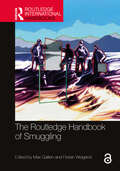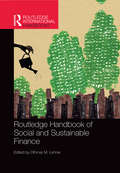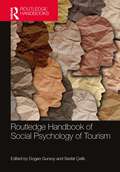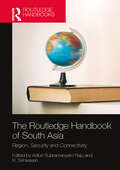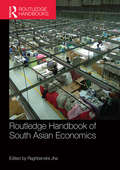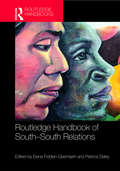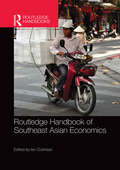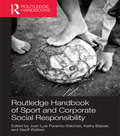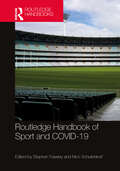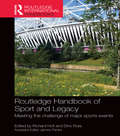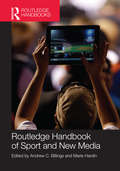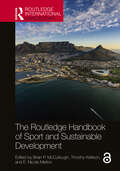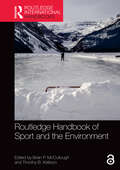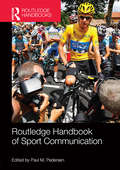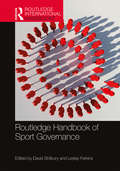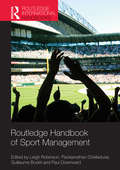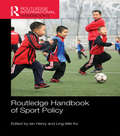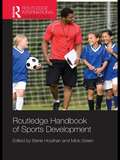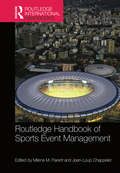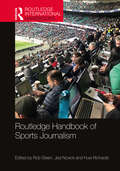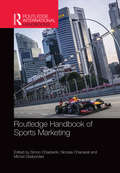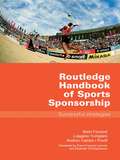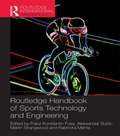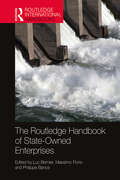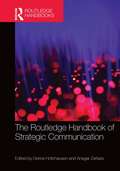- Table View
- List View
The Routledge Handbook of Smuggling (Routledge International Handbooks)
by Max GallienThe Routledge Handbook of Smuggling offers a comprehensive survey of interdisciplinary research related to smuggling, reflecting on key themes, and charting current and future trends. Divided into six parts and spanning over 30 chapters, the volume covers themes such as mobility, borders, violent conflict, and state politics, as well as looks at the smuggling of specific goods – from rice and gasoline to wildlife, weapons, and cocaine. Chapters engage with some of the most contentious academic and policy debates of the twenty-first century, including the historical creation of borders, re-bordering, the criminalisation of migration, and the politics of selective toleration of smuggling. As it maps a field that contains unique methodological, ethical, and risk-related challenges, the book takes stock not only of the state of our shared knowledge, but also reflects on how this has been produced, pointing to blind spots and providing an informed vision of the future of the field. Bringing together established and emerging scholars from around the world, The Routledge Handbook of Smuggling is an indispensable resource for students and researchers of conflict studies, borderland studies, criminology, political science, global development, anthropology, sociology, and geography.
Routledge Handbook of Social and Sustainable Finance (Routledge International Handbooks)
by Othmar M. LehnerRoutledge Handbook of Social and Sustainable Finance brings together an international cast of leading authorities to map out and display the disparate voices, traditions and professional communities engaged in social finance activity. With a clear societal or environmental mission, foundations, individual and group investors, as well as public bodies around the world have become increasingly eager to finance and support innovative forms of doing business. Together, founders and established businesses alike are embracing new sustainable business models with a distinct stakeholder approach to tackle social or environmental problems in what they see as a failed economic system in crisis. As a result, the topic of social and sustainable finance is at the forefront of financial economic thought. This Handbook is divided up into three parts. The first, "The Landscape of Social and Sustainable Finance and Investments", comprises of chapters from a multitude of perspectives in an effort to grasp the entirety of the landscape. The second, "Challenges, Suggestions, Critiques and Debates", focuses on areas ranging from sociological underpinnings to critical takes on markets, and the identification of specialized business models. Amongst ethical considerations, topics include the scaling of impact, an analysis of sustainability as risk prevention and comparative analyses of various methods of justification and measurement. In the third and final section, "Markets and Institutions", contributions range from various perspectives on sustainable banking to environmental marketplaces, and finally on to practical cases and country specific observations. This volume is essential reading for both academics and students in economics and finance. It is also of interest to those who study environmental economics, microeconomics and banking.
Routledge Handbook of Social Psychology of Tourism (Contemporary Geographies of Leisure, Tourism and Mobility)
by Dogan GursoyThe impacts of tourism, an increasingly crucial area of study amongst researchers, are primarily investigated through economic, socio-cultural or environmental perspectives. The social psychological effects of tourism have not been adequately researched despite often being much more important for many destinations, especially where conflicts among different stakeholders exist. This book investigates the social psychological effects of tourism within the scope of social psychology theory. This book introduces the concept of social psychology, as distinct from psychology and sociology, and its relationship to tourism, examines tourism within various theoretical frameworks, e.g. career ladder theory and Maslow’s 7 hierarchy, explores the ways in which tourism changes attitudes and finally investigates social psychological issues in tourism business. It is an important resource for advanced undergraduates, graduate students and relevant practitioners in the field of tourism, and in some cases for a broader public in the field of social psychology.
The Routledge Handbook of South Asia: Region, Security and Connectivity
by Adluri Subramanyam Raju R. SrinivasanThis handbook presents an authoritative overview of South Asia through the lens of geopolitics, political dynamics, economics, human security, and sustainable development. It brings together key insights from various disciplines to provide an in-depth understanding of the genesis, course, and future potential of South Asia as a region. The handbook: • Explores the post-colonial political landscape of India, Pakistan, Sri Lanka, the Maldives, Nepal, Bhutan and Afghanistan and analyses the challenges to political stability and governance in South Asia. • Studies the opportunities and challenges produced by globalization and recommends solutions towards greater connectivity and trade in South Asia. • Delves into the issues of climate change, water and land resource dependency, and energy security and singles out policy challenges as well as positive actions to promote sustainable development and implement the blue economy. • Discusses the political dynamics of regional cooperation between countries and the role of China in South Asian regional affairs. An invaluable addition to the study of South Asia, this volume will be an indispensable resource for scholars, teachers and researchers of political science, international relations, South Asia studies, South Asian politics, history, defence and strategic studies, political economy, developmental studies, public policy and sustainability studies.
Routledge Handbook of South Asian Economics
by Raghbendra JhaThe Routledge Handbook of South Asian Economics addresses the recent economic transformation in South Asia. Leading experts in the field look at the major economic achievements and challenges for the region and examine why economic development across the South Asia region has diverged so significantly since the early 1990s. Providing a cutting-edge review of the economies of South Asia, the Handbook analyzes key growth areas as well as key structural weaknesses and policy challenges facing these economies. Furthermore, it anticipates trends and suggests corrective measures for the South Asian economic region. Sections focus on issues of human development, such as inequality, poverty and quality of schooling, and monetary and fiscal issues, particularly in light of the ongoing global financial crisis. Further sections discuss issues relating to employment and infrastructure, and on the experience of the region with international trade and financial flows, and environmental challenges. Written by renowned and respected experts on South Asian economics, this Handbook will be an invaluable reference work for students and academics as well as policy makers interested in South Asian Studies, Economics and Development Studies.
Routledge Handbook of South-South Relations (Routledge International Handbooks)
by Elena Fiddian-Qasmiyeh Patricia DaleySouth-South cooperation is becoming ever more important to states, policy-makers and academics. Many Northern states, international agencies and NGOs are promoting South-South partnerships as a means of ‘sharing the burden’ in funding and undertaking development, assistance and protection activities, often in response to increased political and financial pressures on their own aid budgets. However, the mainstreaming of Southern-led initiatives by UN agencies and Northern states is paradoxical in many ways, especially because the development of a South-South cooperation paradigm was originally conceptualised as a necessary way to overcome the exploitative nature of North-South relations in the era of decolonisation. This handbook critically explores diverse ways of defining ‘the South’ and of conceptualising and engaging with ‘South-South relations.’ Through 30 state-of-the-art reviews of key academic and policy debates, the handbook evaluates past, present and future opportunities and challenges of South-South cooperation, and lays out research agendas for the next 5-10 years. The book covers key models of cooperation (including internationalism, Pan-Arabism and Pan-Africanism), diverse modes of South-South connection, exchange and support (including South-South aid, transnational activism, and migration), and responses to displacement, violence and conflict (including Southern-led humanitarianism, peace-building and conflict resolution). In so doing, the handbook reflects on decolonial, postcolonial and anticolonial theories and methodologies, exploring urgent questions regarding the nature and implications of conducting research in and about the global South, and of applying a ‘Southern lens’ to a wide range of encounters, processes and dynamics across the global South and global North alike. This handbook will be of great interest to scholars and post-graduate students in anthropology, area studies, cultural studies, development studies, history, geography, international relations, politics, postcolonial studies and sociology.
Routledge Handbook of Southeast Asian Economics
by Ian CoxheadThe Routledge Handbook of Southeast Asian Economics offers new insights into the rapidly-developing economies of Southeast Asia. Despite widespread initial deprivation, Southeast Asia has achieved and sustained a remarkable rate of growth, in the course of which tens of millions have successfully escaped severe poverty. Though the economies of the region vary in many dimensions, integration into the wider East Asian network of production and trade is a notable common feature, one that continues a centuries-long history of engagement with global trade. A second striking feature is the pace and extent of transformation in the structure of production and in sources of household income in the region, which has undergone remarkably rapid industrialization and urban growth. However, the search for sustained and sustainable growth through and beyond middle-income continues to confront pressing economic and policy challenges. This Handbook offers a timely and comprehensive overview of Southeast Asian economic development. Organized according to the logic of chronological and thematic unity, it is structured in these sections: Growth and development over the long term Food, agriculture and natural resources Trade, investment and industrialization Population, labor, and human capital Poverty and political economy Twenty-first century challenges This original Handbook, written by experts in their fields, is unique in the breadth and depth of its coverage. Its forward-looking perspective renders it relevant both now and in the future. This advanced level reference work will be essential reading for students, researchers and scholars of Asian Studies, Economics and Southeast Asian studies.
Routledge Handbook of Sport and Corporate Social Responsibility (Foundations of Sport Management)
by Juan Luis Paramio-Salcines Kathy Babiak Geoff WaltersAs the role of sport in society becomes ever more prominent and as sports organisations become increasingly influential members of the global community, so it has become more important than ever for sport to consider its wider social responsibilities. The Routledge Handbook of Sport and Corporate Social Responsibility is the first book to offer a comprehensive survey of theories and concepts of CSR as applied to sport, and the social, ethical and environmental aspects of sport business and management. It offers an overview of perspectives and approaches to CSR in sport, examines the unique features of the sport industry in relation to CSR, explores the tools, models, common pitfalls and examples of best practice on which managers can draw, and discusses how CSR and corporate citizenship can be integrated into the sport management curriculum. The book covers every key issue and functional area, including implementation, strategic benefits, communication and corporate image, stakeholder engagement, and the measurement and evaluation of CSR policies and practices, and includes detailed international case studies, from the NBA and the Olympic Games to Japanese soccer. The Routledge Handbook of Sport and Corporate Social Responsibility is important reading for any student, researcher, manager or policy maker with an interest in sport business, management, ethics or development.
Routledge Handbook of Sport and COVID-19 (Routledge International Handbooks)
by Stephen Frawley and Nico SchulenkorfThis book examines the initial impact of the coronavirus pandemic on global sport and the varying consequences of the sport shutdown on all levels of society. It also considers the many lessons that have been learnt so that sport stakeholders can successfully adjust and operate under the "new normal." Featuring authors, cases and examples from around the world, the book explores the impact of COVID-19 on sport at all levels, from community sport – where local clubs, gyms and development programmes had to find ways to survive with pitches closed and projects cancelled – to the major professional sport leagues and sport mega-events, with events postponed and teams playing in empty stadia. It considers the economic, social and developmental impacts of the pandemic, including physical, mental and social wellbeing, and looks at how key professional and community sport organizations have reacted to the crisis, reflecting on the lessons learnt and preparations for future pandemics and challenges of similar size and significance. With COVID-19 now endemic in the global population, this is an essential reference for anybody working in sport, from students and researchers to managers, policymakers and development officers.
Routledge Handbook of Sport and Legacy: Meeting the Challenge of Major Sports Events (Routledge International Handbooks)
by Dino Ruta Richard HoltWhat remains of a great sporting spectacle after the last race is run or the final match is played? How can the vast expense of mounting such events be justified? What if there is nothing left behind or what if the legacy is negative, a costly infrastructure which is unused or a debt-ridden host city? The Routledge Handbook of Sport and Legacy addresses perhaps the most important issue in the hosting of major contemporary sporting events: the problem of ‘legacy’. It offers a rigorous, innovative and comparative insight into this contested concept from interdisciplinary and practical perspectives. Major events must now have a conscious, credible and defined policy for legacy to meet public expectations. The book provides a comprehensive survey of the various kinds of legacy that can be delivered, as well as a close examination of the potential benefits and practical challenges involved in each. From ‘hard’ legacies, such as stadia and infrastructure, to ‘soft’ legacies including skill development, attitude change and capacity building, the book offers both a historical case study and an innovative strategic management approach, and establishes the limits of what can realistically be achieved in terms of economic, social, cultural, physical and sporting development. The Routledge Handbook of Sport and Legacy includes contributions from world leading scholars and practitioners and features detailed case studies of major sports events from around the world, including the FIFA World Cup and ten Olympics Games from London in 1908 to London 2012. It is invaluable reading for students and researchers working in sport studies, events management, human geography, economics or planning, and an essential reference for any professional engaged in delivering legacy through sport.
Routledge Handbook of Sport and New Media: Routledge Handbook Of Sport And New Media (Routledge International Handbooks)
by Andrew C. Billings Marie Hardin Natalie A. BrownNew media technologies have become a central part of the sports media landscape. Sports fans use new media to watch games, discuss sports transactions, form fan-based communities, and secure minutiae about their favorite players and teams. Never before have fans known so much about athletes, whether that happens via Twitter feeds, fan sites, or blogs, and never before have the lines between producer, consumer, enactor, fan and athlete been more blurred. The Internet has made virtually everything available for sports media consumption; it has also made understanding sports media substantially more complex. The Routledge Handbook of Sport and New Media is the most comprehensive and in-depth study of the impact of new media in sport ever to be published. Adopting a broad, interdisciplinary approach, the book explores new media in sport as a cultural, social, commercial, economic, and technological phenomenon, examining the profound impact of digital technologies on that the way that sport is produced, consumed and understood. There is no aspect of social life or commercial activity in general that is not being radically influenced by the rise of new media forms, and by offering a "state of the field" survey of work in this area, the Routledge Handbook of Sport and New Media is important reading for any advanced student, researcher or practitioner with an interest in sports studies, media studies or communication studies.
The Routledge Handbook of Sport and Sustainable Development (Routledge International Handbooks)
by Brian P. McCulloughThe Routledge Handbook of Sport and Sustainable Development is a comprehensive and powerful survey of the ways in which sport engages with its social, environmental, and ethical responsibilities. It considers how sport can use its unique profile and platform to influence the attitudes of sport fans and consumers to promote positive social and environmental action around the world and to contribute to sustainable development, perhaps the most important issue of our time. The book is structured around the 17 UN Sustainable Development Goals, with a section devoted to each goal that contains chapters reviewing key theory and current research, measurement and evaluation issues, and the application of current knowledge in real-world development situations. Drawing on research and expertise from management, sociology, development studies, psychology, and other disciplines, the book examines the role that sport must play in areas such as health and well-being, poverty, education, gender equality, decent work, responsible consumption, and climate action. Representing a keynote work on the wider social responsibilities of sport as both an industry and sociocultural activity, this is essential reading for any advanced student or researcher working in sport development, sport management, sport sociology, event studies, development studies, or environmental studies, and for any development practitioner or sport management professional looking to understand how to achieve positive social change in and through sport.
Routledge Handbook of Sport and the Environment (Routledge International Handbooks)
by Brian P. McCullough Timothy B. KellisonThe natural environment is a central issue in both academic and wider societal discourse. The global sport industry is not immune from this discussion and has to confront its responsibility to reduce its impact on the natural environment. This book goes further than any other in surveying both the challenges and the opportunities presented to the sports industry as it engages with the sustainability agenda, exploring the various ways in which sport scholars can integrate sustainability into their research. With a multidisciplinary sweep, including management, sociology, law, events, and ethics, this is a ground-breaking book in the study of sport. Drawing on cutting-edge research, it includes over thirty chapters covering all the most important themes in contemporary sport studies such as: climate change, sustainability, and corporate social responsibility ethics, governance, and the law event management, tourism, and pollution marketing, branding, and consumer behavior the Olympics, urban development, and mega-event legacies. With contributions from world-leading researchers and practitioners from around the globe, this is the most comprehensive book ever published on sport and the environment.
Routledge Handbook of Sport Communication (Routledge International Handbooks)
by Paul M. PedersenThe Routledge Handbook of Sport Communication is the only book to offer a fully comprehensive and in-depth survey of the contemporary discipline of sport communication. It explores communication within, through, and for sport in all its theoretical, conceptual, cultural, behavioral, practical and managerial aspects, tracing the contours of this expansive, transdisciplinary and international discipline and demonstrating that there are few aspects of contemporary sport that don’t rely on effective communications. Including contributions from leading sport media and communications scholars and professionals from around the world, the book examines emerging (new and social) media, traditional (print, broadcast and screen) media, sociological themes in communication in sport, and management issues, at every level, from the interpersonal to communication within and between sport organisations and global institutions. Taking stock of current research, new ideas and key issues, this book is an essential reference for any advanced student, researcher or practitioner with an interest in sport communication, sport business, sport management, sport marketing, communication theory, journalism, or media studies.
Routledge Handbook of Sport Governance (Routledge International Handbooks)
by David Shilbury Lesley FerkinsThe Routledge Handbook of Sport Governance is a comprehensive and authoritative survey of the wide range of issues shaping sport governance. It considers the evolution of the sport industry from a largely amateur, volunteer-driven sector into the globalised business that it is today and examines how professionalisation has fundamentally shifted the governance landscape for sport organisations and all those working within sport. Written by a team of leading sport management scholars from around the world, the book is organised around five key themes: • Part I: Overview of sport governance• Part II: Environmental context and policy perspectives• Part III: Ownership structures and governance models: Implications for sport governance• Part IV: Board roles in the governance process• Part V: Future sport governance challenges Each chapter reviews the most recent research available and, in some cases, presents new data to support previously published studies. As sport governance is a relatively young field, each chapter maps future research needs to provide direction for sport governance scholars. A special feature of the handbook is a series of nine shorter research chapters in Part IV examining board roles in the governance process, tying theory to the day-to-day practical aspects of running a sport organisation. With broader and deeper coverage of the key issues in contemporary sport governance than any other book, this handbook is essential reading for students, researchers and practitionersin sport business and management.
Routledge Handbook of Sport Management (Routledge International Handbooks)
by Packianathan Chelladurai Leigh Robinson Paul Downward Guillaume BodetThe Routledge Handbook of Sport Management is the most up-to-date and comprehensive guide to theory and practice in sport management ever published. It provides students and scholars with a broad ranging survey of current thinking in contemporary sport management, exploring best practice in core functional areas and identifying important future directions for new research. Key topics covered in the book include: managing performance marketing human resource management the economics and finance of sport strategy managing change governance of sports organizations customer relations branding and retail. With contributions from leading scholars and professionals from around the world, the book illustrates the global nature of contemporary sport business and highlights the opportunities and challenges for managers operating in an international market place. Representing a definitive survey of contemporary issues in sport management, this is an essential reference for all students, scholars and practitioners working in sport.
Routledge Handbook of Sport Policy (Routledge International Handbooks)
by Ian Henry Ling-Mei KoIt is difficult to fully understand the role that sport plays in contemporary global society without understanding how and why governments, NGOs and other organizations formulate and implement policy relating to sport. The Routledge Handbook of Sport Policy is the only book to offer a comprehensive overview of current perspectives, techniques and approaches to the analysis of sport policy around the world. The book introduces a diverse range of approaches to policy analysis across the full range of political and societal contexts, including developed and developing economies; state-centric, mixed economy and market-led systems, and both liberal democracies and political systems characterized by a dominant elite. It is arranged into five sections addressing the key topics and themes in the analysis of contemporary sport policy, including: theory and its implications for methodology globalization, governance, partnerships and networks elite sport policy development, sport and joint policy agendas sport policy and social theory. With contributions from leading policy analysts around the world, including Europe, North America, the Middle East and Asia, this book is important reading for any student, researcher or professional working in sport management, sport development, sport and society, or mainstream public policy, policy analysis or social policy.
Routledge Handbook of Sports Development (Routledge International Handbooks)
by Barrie Houlihan Mick GreenSports development has become a prominent concern within both the academic study of sport and within the organisation and administration of sport. Now available in paperback, the Routledge Handbook of Sports Development is the first book to comprehensively map the wide-ranging territory of sports development as an activity and as a policy field, and to offer a definitive survey of current academic knowledge and professional practice. Spanning the whole spectrum of activity in sports development, from youth sport and mass participation to the development of elite athletes, the book identifies and defines the core functions of sports development, exploring the interface between sports development and cognate fields such as education, coaching, community welfare and policy. The book presents important new studies of sports development around the world, illustrating the breadth of practice within and between countries, and examines the most important issues facing practitioners within sports development today, from child protection to partnership working. With unparalleled depth and breadth of coverage, the Routledge Handbook of Sports Development is the definitive guide to policy, practice and research in sports development. It is essential reading for all students, researchers and professionals with an interest in this important and rapidly evolving discipline.
Routledge Handbook of Sports Event Management
by Milena M. Parent Jean-Loup ChappeletFrom the Olympic Games to community-level competitions, sports events can be complex and pose a particular set of managerial challenges. The Routledge Handbook of Sports Event Management surveys the management of sports events around the world of every size and scale, from small to mega-events, including one-off and recurring events, and single-sport and multi-sport events. The book adopts a unique stakeholder perspective, structured around the groups and individuals who have an interest in and co-create sports events, including organising committees, promoters, sport organisations, spectators, community groups, sponsors, host governments, the media and NGOs. Each chapter addresses a specific stakeholder, defines that stakeholder and its relationships with sports events, describes the managerial requirements for a successful event, assesses current research and directions for future research, and outlines the normative dimensions of stakeholder engagement (such as sustainability and legacy). No other book takes such a broad view of sports event management, surveying key theory, current research, best practice, and moral and ethical considerations in one volume. With contributions from leading sport and event scholars from around the world, the Routledge Handbook of Sports Event Management is essential reading for any advanced student, researcher or professional with an interest in sport management, sport development, sport policy or events.
Routledge Handbook of Sports Journalism (Routledge International Handbooks)
by Rob Steen Jed Novick Huw RichardsThe Routledge Handbook of Sports Journalism is a comprehensive and in-depth survey of the fast-moving and multifaceted world of sports journalism. Encompassing historical and contemporary analysis, and case studies exploring best practice as well as cutting edge themes and issues, the book also represents an impassioned defence of the skill and art of the trained journalist in an era of unmediated digital commentary. With contributions from leading sports-media scholars and practising journalists, the book examines journalism across print, broadcast and digital media, exploring the everyday reality of working as a contemporary reporter, editor or sub-editor. It considers the organisations that shape output, from PR departments to press agencies, as well as the socio-political themes that influence both content and process, such as identity, race and gender. The book also includes interviews with, and biographies of, well-known journalists, as well as case studies looking at the way that some of the biggest names in world sport, from Lance Armstrong to Caster Semenya, have been reported. This is essential reading for all students, researchers and professionals working in sports journalism, sports broadcasting, sports marketing and management, or the sociology or history of sport.
Routledge Handbook of Sports Marketing (Routledge International Handbooks)
by Simon Chadwick Michel Desbordes Nicolas ChanavatSports marketing has become a cornerstone of successful sports management and business, driving growth in sport organisations and widening fan-bases. Showcasing the latest thinking and research in sports marketing from around the world, the Routledge Handbook of Sports Marketing goes further than any other book in exploring the full range of this exciting discipline. Featuring contributions from world-leading scholars and practitioners from across the globe, the book examines theories, concepts, issues and best practice across six thematic sections—brands, sponsorship, ambush marketing, fans and spectators, media, and ethics and development—and examines key topics such as: consumer behaviour marketing communications strategic marketing international marketing experiential marketing and marketing and digital media Comprehensive and authoritative, the Routledge Handbook of Sports Marketing is an essential reference for any student or researcher working in sport marketing, sport management, sport business, sports administration or sport development, and for all practitioners looking to develop their professional knowledge.
Routledge Handbook of Sports Sponsorship: Successful Strategies
by Alain Ferrand Luiggino Torrigiani Andreu Camps i PovillThe Routledge Handbook of Sports Sponsorship provides a comprehensive guide to the successful management of sport sponsorship. From the development of an appropriate strategy to the implementation of the sponsorship operation through to post-event analysis, this book offers an authoritative reference for large and small events. The text also provides an accessible review of the legal issues associated with marketing, copyright and contracts in print, television and radio sponsorship, illustrated with a wealth of case studies. Includes: • Sports marketing and sports management theory.• Stage by stage analysis of the sponsorship process •The roles of different key stakeholders in the process • Thorough explanation of copyright and contract law for sports sponsorship• Major international sports sponsorship case-studies examined from concept stage through to post-event analysis. The Routledge Handbook of Sports Sponsorship is essential reading for students and a valuable reference for professionals in sports law, sports management, sports marketing and brand management.
Routledge Handbook of Sports Technology and Engineering (Routledge International Handbooks)
by Aleksandar Subic Franz Konstantin Fuss Martin Strangwood Rabindra MehtaFrom carbon fibre racing bikes to ‘sharkskin’ swimsuits, the application of cutting-edge design, technology and engineering has proved to be a vital ingredient in enhanced sports performance. This is the first book to offer a comprehensive survey of contemporary sports technology and engineering, providing a complete overview of academic, professional and industrial knowledge and technique. The book is divided into eight sections covering the following topics : Sustainable Sports Engineering Instrumentation Technology Summer Mobility Sports Winter Mobility Sports Apparel and Protection Equipment Sports Implements (racquets, clubs, bats, sticks) Sports Balls Sports Surfaces and Facilities Written by an international team of leading experts from industry, academia and commercial research institutes, the emphasis throughout the book is on innovation, the relationship between business and science, and the improvement of sports performance. This is an essential reference for anybody working in sports technology, sports product design, sports engineering, biomechanics, ergonomics, sports business or applied sport science.
The Routledge Handbook of State-Owned Enterprises (Routledge International Handbooks)
by Luc BernierState-owned enterprises make up roughly 10 percent of the world economy, yet they are woefully understudied. This handbook offers the first synthesis of the topic since the 1980s and offers a comprehensive reference for a generation. The authors provide a detailed explanation of the theory that underpins the expansion of state-owned enterprises in the 21st century. Each chapter delivers an overview of current knowledge, as well as identifying issues and relevant debates for future research. The authors explain how state-owned enterprises are used in both developed and developing countries and offer an insight into complex and fascinating organizations such as the German municipal conglomerates or the multinational companies owned by states. New modes of governance and regulation have been invented to make sure they act in the public interest. This handbook brings together a wealth of international scholars, offering multiple theoretical perspectives to help shape a brave new world. It will be of interest to teachers and students of Economics, Public Administration and Business, academics, established researchers and PhD students seeking rigorous literature reviews on specific aspects of SOEs, as well as practitioners and decision makers in international organizations.
The Routledge Handbook of Strategic Communication (Routledge Handbooks in Communication Studies)
by Derina Holtzhausen Ansgar ZerfassThe Routledge Handbook of Strategic Communication provides a comprehensive review of research in the strategic communication domain and offers educators and graduate-level students a compilation of approaches to and studies of varying aspects of the field. The volume provides insights into ongoing discussions that build an emerging body of knowledge. Focusing on the metatheoretical, philosophical, and applied aspects of strategic communication, the parts of the volume cover: • Conceptual foundations, • Institutional and organizational dimensions, • Implementing strategic communication, and • Domains of practice An international set of authors contributes to this volume, illustrating the broad arena in which this work is taking place. A timely volume surveying the current state of scholarship, this Handbook is essential reading for scholars in strategic communication at all levels of experience.
